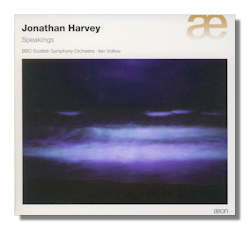
The Internet's Premier Classical Music Source
Related Links
- Harvey Reviews
- Latest Reviews
- More Reviews
-
By Composer
-
Collections
DVD & Blu-ray
Books
Concert Reviews
Articles/Interviews
Software
Audio
Search Amazon
Recommended Links
Site News
 CD Review
CD Review
Jonathan Harvey

Speakings
- Scena for Violin & Ensemble (1992)
- Jubilus for Viola & Ensemble (2002)
- Speakings for Large Orchestra & Electronics (2007-8)
Elizabeth Layton, violin
Scott Dickinson, viola
BBC Scottish Symphony Orchestra/Ilan Volkov
Æon AECD1090
Jonathan Harvey, who was born in 1939, is one of those "major" yet under-appreciated British composers (like George Benjamin, Michael Berkeley, Hugh Wood and even Peter Maxwell Davies) whose following has somehow remained strongest in the country of their birth. The achievement of Harvey, nevertheless, is very significant. Here is a CD of intriguing, beautiful and highly enjoyable music with the theme of vocalism – hence the title. It should be snapped up immediately by anyone open to the kind of explorations at which Harvey is so accomplished; and of course by those collecting Harvey's works.
Harvey's first influences included Schoenberg, Berg, Messiaen and Britten. Though you'd hardly detect that in his more recent output. While a cellist in the BBC Scottish Symphony Orchestra, Harvey developed a deep interest in Stockhausen. In the late 1960s, while working and teaching in the USA, Harvey met Milton Babbitt (at Princeton). Boulez invited him to IRCAM a decade later. The list of academic qualifications, major teaching posts and tenures as Composer in Residence (at the Huddersfield Contemporary Music Festival in 2009, for instance) testifies to Harvey's prominence among composers and musicians in Europe. Another major influence on Jonathan Harvey has been Eastern religion and thinking.
Harvey's music has a sweetness, sensitivity and gentleness that mixes strangely well with the uncompromising sound worlds he creates. These often include electronics, as is the case with the third and title work, Speakings on this CD. Its other pieces both concentrate on the lyrical – and vocal – qualities of the violin and viola, played here by Elizabeth Layton and Scott Dickinson respectively. Their playing is no less commendable for its direct acceptance of difficult yet highly meaningful writing than is the performance by the BBC Scottish Symphony Orchestra (one with which Harvey has a long association) under its enterprising and accomplished conductor, Ilan Volkov. In 1999 Seiji Ozawa appointed Volkov as Assistant Conductor with the Boston Symphony Orchestra; he's been in Glasgow since 2003 and it seems as though he can turn his hand to anything. What he has done for new music with the highly-esteemed BBC Scottish is quite remarkable. This CD testifies to that. Their playing is enthusiastic, fresh, committed yet in no way peremptory.
Here they're tackling scores of complexity and intricacy that could all but defeat other "provincial" teams. These are the first and only recordings of these works. But one could hardly look for more appositely-executed performances, nor for ones infused with such expression – and delight. For Harvey is a very positive composer: as, and after, you listen to one of his compositions, you're struck by the extent to which it sets its own uncluttered yet richly embedded "agenda", then follows it through using those and only those means necessary to explore and expose the musical and philosophical components of which it's made. In this case, Harvey is using orchestra and soloists to examine the possible roles of instruments as sources of vocalism.
How can speech and song be "approximated" by the orchestra and stringed instruments, in particular? Speakings uses close analysis (but analysis born of Harvey's immense experience), automatic transcription and special "orchestration software" created at IRCAM to privilege the musical qualities which the production of speech has. This music is not only about creating a "virtual voice". But about what's already present in instruments. Imitation takes second place to styles of playing which are, for example, declamatory, emphatic, aroused. The last three minutes of Speakings' second "movement" [tr.4], for example, suggest ways in which the brass can have demonstrable feelings in the way someone speaking with (elevated) emotion can. Later nervousness, sarcasm and tentativeness, as well as anger and even coquettishness seem to be evoked by the sounds of this music. As it draws to its quiet close, you're left with feelings parallel to those which you'd have when a loved one, or adversary, or someone you're never going to see again ceases to talk.
Scena is a series of tableaux in which the violinist participates in what amount almost to rituals; and rituals to which the vocal element is central. Taking the demonstrative further, Jubilus, the longer of the two other works, evokes the poetry of Buddhist rituals, chant; and the meeting point between the intensity of the chanter and the impression on those who hear.
Æon's usual standard of production is evident in this Digipak with booklet in English and French – useful background, biographies and some photographs. The acoustic is close and aids focus on music that needs concentration. This is a CD you should not miss if its area of sound and thought interest you even slightly.
Copyright © 2010 by Mark Sealey.





















